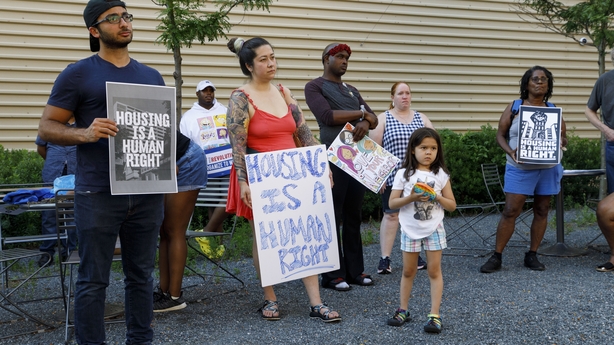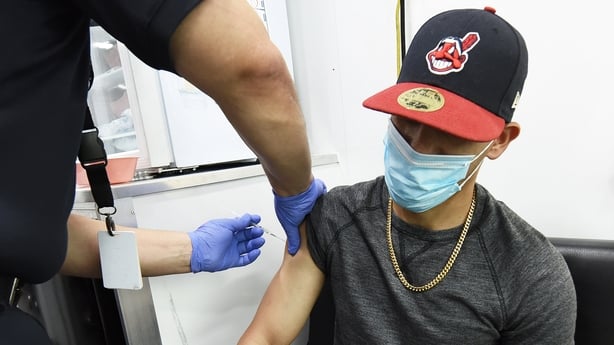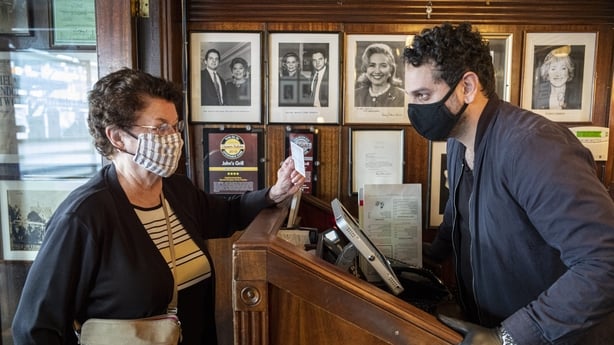The US Supreme Court has blocked the extension of a federal moratorium on evictions, ending a protection granted to millions who have struggled to afford rent during the Covid-19 pandemic.
In a 6-3 ruling, the court sided with homeowners who claimed to be victims of unwarranted measures, and argued that any renewal of a moratorium must be decided by Congress and not health officials.
The court's unsigned majority opinion said the Centers for Disease Control and Prevention (CDC) had exceeded its authority with its latest order temporarily halting evictions in areas where coronavirus cases were surging.
"It is up to Congress, not the CDC, to decide whether the public interest merits further action here," read the eight-page majority opinion.
The court's three liberal justices dissented, citing fears that evictions could exacerbate the spread of the Delta variant.
The case was prompted by the CDC's latest, two-month-long moratorium, rolled out on 3 August.
An earlier, September 2020 moratorium issued by the CDC expired after a Supreme Court ruling in June said it could not continue beyond 31 July without authorisation from Congress.
President Joe Biden's administration had urged Congress to approve an extension, but politicians failed to do so before summer recess.
Under pressure from Democrats, the CDC ordered a new moratorium, citing public health risks posed by the pandemic.
The Supreme Court has now ended that moratorium.
White House Press Secretary Jen Psaki said the administration "is disappointed" that the court blocked the eviction moratorium "while confirmed cases of the Delta variant are significant across the country".
The moratorium "saved lives by preventing the spread of the Covid-19 virus throughout the pandemic", Ms Psaki said in a statement.
The White House had expected the moratorium to be challenged in court, but hoped the extra time would allow for emergency rental assistance funds approved by Congress to reach those in need.

But much of that money is still caught in red tape, even as around 3.5 million people in the US told the Census Bureau they face eviction in the next two months.
In light of the ruling "and the continued risk of Covid-19 transmission, President Biden is once again calling on all entities that can prevent evictions... to urgently act to prevent evictions," Ms Psaki said.
Oregon reintroduces mask mandate
Meanwhile, masks will have to be worn outside in Oregon from today, making the northwestern state the first in the country to reintroduce the mandate.
"The Delta variant is spreading fast and wide, throwing our state into a level of crisis we have not yet seen in the pandemic," said Governor Kate Brown.
"Cases and hospitalisations are at a record high," she said. A 2019 study found Oregon has among the lowest number of hospital beds per capita in the country
"Masks have proven to be effective at bringing case counts down, and are a necessary measure right now, even in some outdoor settings, to help fight Covid and protect one another," added Ms Brown.
The rules mean everyone - vaccinated and otherwise - must wear a mask in any public place where people from different households are mixing.

Oregon, along with other states, already requires the wearing of masks indoors, but is the first to require them routinely outside.
Los Angeles County in California announced earlier this month that masks had to be worn at large outdoor events, such as sports fixtures and concerts.
Rise in Covid cases
The United States is suffering a huge upswing in Covid-19 infections, driven by the highly infectious Delta variant.
Scientists say the fight against the disease is being hampered by poor take-up of vaccines, which are free and readily available.
Around half of all Americans are fully vaccinated, although take-up varies considerably from region to region.

Despite their proven effectiveness, masks - and vaccines - are hugely controversial in the United States, with opposition driven by politics, distrust of government and antipathy towards science.
Health professionals hope that the full regulatory approval granted to the Pfizer jab on Monday will help overcome unfounded suspicions that the vaccine is unsafe.
A growing number of public and private bodies are requiring employees to be vaccinated, but suspicions remain strong.
A senior firefighter was being investigated in Los Angeles on Tuesday after posting a lengthy video in which he labelled the fire department's vaccine requirement for staff as "tyranny".

